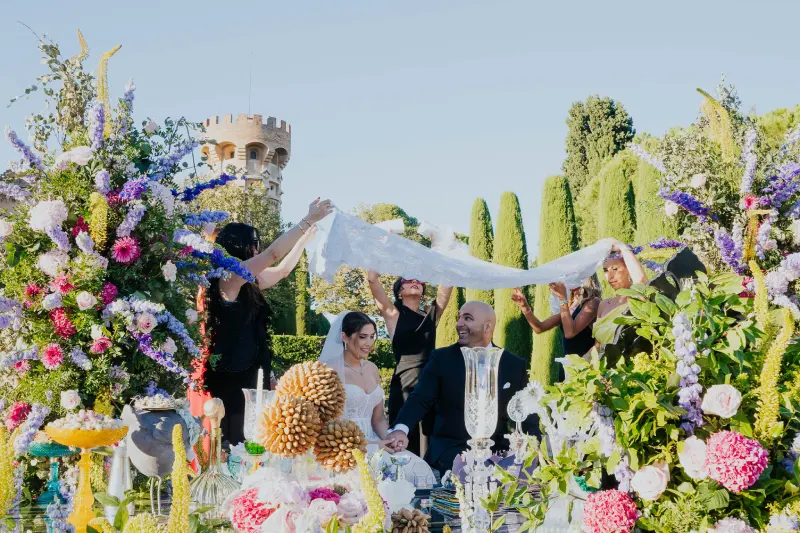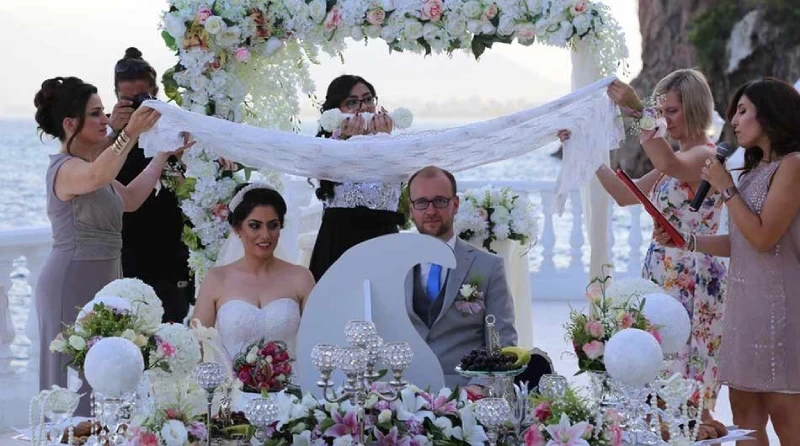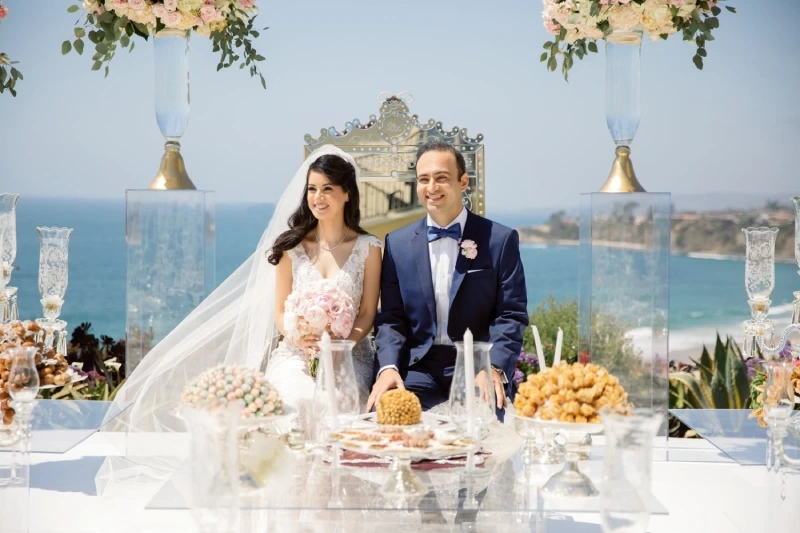Planning a Persian wedding abroad can present a unique set of challenges, but with the right tips and insights, it can also be an incredibly rewarding experience. Whether you’re a bride or groom of Iranian descent looking to celebrate your heritage in a foreign country, or you simply admire the rich cultural traditions of a Persian wedding, this article is here to guide you.
Incorporating elements of tradition, symbolism, and celebration, Persian weddings are known for their grandeur and attention to detail. From the stunning Sofreh Aghd, the ceremonial spread filled with symbolic items, to the mesmerizing Persian music and dance, every aspect of a Persian wedding is infused with meaning and beauty.
In this article, we’ll provide you with valuable tips on finding the perfect overseas location, navigating legal requirements, and selecting vendors who understand the intricacies of a Persian wedding. We’ll also dive into the significance of various customs and traditions, ensuring you’re well-prepared to incorporate them into your special day.
Join us as we journey into the world of planning a Persian wedding abroad, blending modernity and tradition to create a truly unforgettable celebration.
Benefits of Planning a Persian Wedding Abroad
Planning a Persian wedding abroad offers a unique blend of cultural richness and personal expression that can enhance the overall experience of your special day. One of the primary benefits is the opportunity to choose a stunning backdrop that reflects your personal preferences, whether it’s a picturesque beach, a historic castle, or a bustling cityscape. This flexibility allows couples to create a memorable setting that not only adds beauty but also resonates with their love story. Many couples find that tying the knot in a foreign location can be a more intimate experience, allowing them to focus on each other and their loved ones without the distractions often present in their hometowns.
Another significant advantage of hosting a Persian wedding outside of Iran or the traditional locations is the potential for a more diverse guest list. Inviting family and friends from various parts of the world can create a multicultural atmosphere that celebrates not only Persian traditions but also the unique backgrounds of all attendees. This blending of cultures can enrich the wedding experience, offering guests a chance to engage with a variety of customs, cuisines, and celebrations. It also encourages inclusivity, making everyone feel valued and appreciated on this momentous occasion.
Additionally, planning a wedding abroad can often lead to cost-effective options, depending on the destination. Many couples find that specific countries offer luxurious venues and services at a fraction of the price they would pay in their home country. This affordability can allow for more extravagant elements in the wedding, such as hiring top-notch florists, caterers, or entertainment, ultimately creating a more lavish event. By carefully selecting a location that aligns with their budget, couples can have their dream Persian wedding without breaking the bank.
Considerations When Planning a Persian Wedding Abroad
When planning a Persian wedding abroad, several important considerations must be taken into account to ensure a seamless experience. First and foremost is the legal aspect of getting married in a foreign country. Each nation has its own regulations regarding marriage licenses, residency requirements, and documentation needed for foreign citizens. It’s essential to research these legal requirements well in advance to avoid any last-minute complications. Engaging a local wedding planner who understands the legal landscape can be incredibly beneficial, providing guidance and support throughout the process.
Another critical factor to consider is the logistics involved in transporting key elements of a Persian wedding, such as décor, attire, and traditional items. The Sofreh Aghd, an integral part of the ceremony, often includes numerous symbolic items, many of which may need to be sourced from home. Couples should strategize how to either transport these items or find local alternatives that still honor the tradition. Additionally, it’s vital to consider the accommodations for guests, ensuring that there are enough options available for everyone attending the wedding. Providing clear information about travel arrangements, local attractions, and accommodations can make the experience much more enjoyable for your guests.
Cultural sensitivity is another crucial consideration when planning a Persian wedding abroad. Understanding the customs and practices of the host country will help ensure that the wedding is not only respectful but also harmonious with local traditions. This might include selecting a venue that aligns with local customs or integrating aspects of the local culture into the ceremony or reception. Engaging with local vendors who appreciate and understand Persian traditions can also enhance the authenticity of the celebration, creating a beautiful fusion of cultures that reflects both the couple and their surroundings.
Choosing the Perfect Destination for a Persian Wedding
Selecting the right destination for a Persian wedding abroad is a pivotal part of the planning process, as it sets the tone for the entire celebration. Factors such as climate, scenery, and accessibility should all be taken into account. For instance, if a couple dreams of a beach wedding, they might consider tropical destinations like Bali or the Maldives, which offer breathtaking sunsets and serene landscapes. Alternatively, a European city like Paris or Florence could provide a romantic backdrop filled with history and charm. The choice of location will not only influence the wedding’s aesthetic but also the overall experience for both the couple and their guests.
Accessibility is another crucial aspect to consider. It’s essential to choose a location that is easily reachable for the majority of guests, especially those traveling from abroad. This may involve selecting a destination with a major international airport or considering venues that offer convenient transportation options. Additionally, couples should think about the time of year they plan to host their wedding, as weather and local events can significantly impact travel arrangements. For instance, a wedding in the Mediterranean may be ideal during the spring or fall when the weather is mild and tourist crowds are thinner.
Finally, couples should consider their own emotional connection to the destination. A location that holds personal significance, such as where they first vacationed together or a city they’ve always dreamed of exploring, can make the wedding even more special. This personal touch adds depth to the celebration, allowing the couple to weave their love story into the fabric of the wedding day. Ultimately, the perfect destination should resonate with the couple’s shared values and experiences, creating a memorable setting for their union.
Cultural Aspects to Consider When Planning a Persian Wedding Abroad
Incorporating cultural aspects into a Persian wedding abroad is essential for honoring heritage while embracing the beauty of a foreign setting. One of the most significant cultural elements is the Sofreh Aghd, the ceremonial spread that symbolizes various blessings and wishes for the couple. This display typically includes items such as honey, mirror, candles, and herbs, each carrying deep meaning. Couples should plan how to create a stunning and authentic Sofreh Aghd using local materials or by transporting traditional items from home. Collaborating with a florist or designer familiar with Persian customs can help achieve a beautiful presentation that resonates with guests.
Another key cultural aspect to consider is the music and dance that accompany a Persian wedding. Music plays a vital role in setting the atmosphere and enhancing the celebration. Couples should look for musicians or DJs who specialize in Persian music, ensuring that the playlist features traditional songs as well as contemporary favorites. Incorporating live performances, such as a Persian band or dancers, can elevate the experience and encourage guests to participate in traditional dances, fostering a lively and joyous ambiance. This infusion of culture not only entertains but also educates guests about Persian heritage.
Lastly, food is a significant component of Persian weddings that should not be overlooked. Traditional Persian cuisine is known for its rich flavors and variety, featuring dishes such as kebabs, rice, and an array of aromatic stews. When planning a wedding abroad, couples must choose a catering service that can authentically replicate these dishes or find local restaurants that specialize in Persian cuisine. The culinary experience will be a highlight for guests, providing them with a taste of Persian culture while also catering to diverse palates. Thoughtful menu planning can transform the wedding into a delightful culinary journey that reflects the couple’s heritage and love for their culture.
Budgeting and Cost Considerations for a Persian Wedding Abroad
Budgeting for a Persian wedding abroad involves careful planning and a clear understanding of potential costs associated with the various elements of the celebration. One of the first steps in establishing a budget is to determine the overall cost of the destination itself, including venue rental, accommodations, and travel expenses. Different locations can vary significantly in price, so researching and comparing options is essential. Couples should also consider the spending habits of their guest list, as this can influence the overall budget and the level of extravagance they wish to achieve.
When budgeting, it’s important to account for the various aspects unique to Persian weddings. These may include additional costs associated with traditional elements like the Sofreh Aghd, which may require sourcing specific items or hiring specialized decorators. Similarly, incorporating live music and cultural performances into the wedding can also add to the costs, but these elements are often essential for creating an authentic experience. Couples should prioritize which traditional elements are most important to them and allocate funds accordingly, ensuring that they remain within their overall budget.
In addition to the wedding day expenses, couples should also plan for potential unforeseen costs that may arise during the planning process. Currency fluctuations, unexpected vendor fees, or additional travel costs can quickly add up, making it essential to build a contingency fund into the budget. This flexibility will allow couples to adapt to any changes without compromising the quality of their celebration. By maintaining a clear budget and being mindful of both expected and unexpected costs, couples can enjoy a beautiful Persian wedding abroad that celebrates their love and culture without financial stress.
Legal and Logistical Requirements for a Persian Wedding Abroad
Navigating the legal requirements for a wedding abroad can be one of the more complex aspects of planning a Persian wedding. Each country has its own set of rules regarding marriage licenses, residency requirements, and documentation needed for foreign nationals. Couples should thoroughly research the legal stipulations of their chosen destination well in advance. This may involve gathering necessary documents such as birth certificates, passports, and affidavits of eligibility to marry. Engaging a local wedding planner or legal advisor familiar with the process can help streamline this aspect, ensuring that all legalities are properly handled.
In addition to legal requirements, logistical considerations play a crucial role in the planning process. Couples must coordinate travel arrangements for themselves and their guests, which includes booking flights, securing accommodations, and organizing transportation to and from the venue. Providing guests with clear information about travel logistics can ease the process and ensure everyone arrives on time for the big day. Couples should also consider creating a wedding website with essential details, including travel tips, local attractions, and a schedule of events, making it easier for guests to navigate their journey.
Moreover, it’s essential to have contingency plans in place for potential challenges that may arise while planning a wedding abroad. This could involve having backup vendors in case of emergencies, understanding the local healthcare system for any unforeseen circumstances, or even having a plan for inclement weather if the wedding is outdoors. Being prepared for various scenarios will help couples feel more relaxed and confident leading up to their wedding day. With careful attention to legal and logistical requirements, couples can ensure a smooth and enjoyable experience while celebrating their Persian wedding abroad.
Conclusion: Celebrating Love and Culture in a Foreign Land
Planning a Persian wedding abroad is a beautiful way to blend cultural traditions with the excitement of a new and exotic location. Through careful consideration of various aspects, including legal requirements, budgeting, and cultural elements, couples can create a unique and unforgettable celebration that honors their heritage while embracing the beauty of their chosen destination. The experience of sharing this special day with family and friends in a foreign land can lead to lasting memories and cherished moments that will be talked about for years to come.
As couples embark on this journey, they are encouraged to remain flexible and open-minded, allowing the natural flow of planning to guide them. Embracing the local culture and infusing it with Persian customs can create a harmonious atmosphere that reflects both the couple’s love story and the beauty of their surroundings. In doing so, they are not only celebrating their union but also enriching the experience for their guests, creating a shared appreciation for the diverse tapestry of cultures represented at the wedding.
Ultimately, a Persian wedding abroad offers an opportunity to celebrate love in a way that is meaningful, vibrant, and deeply personal. By weaving together cherished traditions and modern elements, couples can craft a celebration that resonates with their hearts and those of their loved ones. As they exchange vows and embark on this new chapter, they will carry with them the love, joy, and cultural richness that define their journey together, creating an unforgettable experience that will be treasured for a lifetime.




